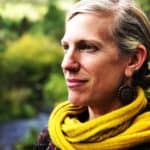“When Moses stands in front of the tribes of Israel before they enter the holy land he gives a choice to follow the path of greed and exploitation or to choose life. In rewilding, may we learn to see the blessings around us, but not turn a blind eye to the curses.”
This week, in Re’eh, we get the chance to do some real reckoning as we receive a set of laws that govern behaviors historically used as justification for political and religious violence. This single set of 55 laws has borne enormous influence, charting our shift away from “wild” desert ways toward “civilized” urban cultures full of rules, structures, and obligations.
Moses delineates how to release debt; when to free the enslaved; how to tithe; and when to celebrate pilgrimage festivals. But see what else is required of us in Re’eh: “destroy their altars, break up their memorial stones, burn down their sacred trees, and obliterate their gods from that place.” Moses offers a stark choice: observe and be blessed, or ignore and be cursed.
The promise we are given in this week’s parsha for standing up against idol worship e.g. greed is the promise of dwelling peacefully in the land. This is the same promise we get in regards to keeping the shmita laws. Time and again in Torah we learn that if you do what’s asked of you, the land will provide you with bounty. From ample rains in their proper time, to fertile soil. From peaceful sleep, to safe and secure living for you and your people.
A constructivist view might suggest that these laws are designed to reduce the brutal toll of unfettered consumption on the earth, and to rethink land management practices and land ownership patterns that disproportionately render black, brown, and indigenous people as farmers and food chain workers, but not land owners. To that end, abiding by Shmita seems more essential now than ever before.
In Re’eh, the threatened punishment for human failings is drought. With today’s mega-drought in much of the West, record-breaking heat waves, and raging wildfires, there is full climate mayhem. Consider California: despite extreme drought in 58% of this state, it remains the nation’s leading ag state, producing 13% of our food (including some of the most water-intensive crops like almonds, pistachios, citrus, and pomegranates). With Central Valley farmers warned about potential water cutoffs, imagine what would happen if for one year – 5782 – the Jewish agribusiness groves become accessible for food insecure farmworker families – not as a voluntary charitable gift – but as a stewardship act every seven years to foster equity and grow community food sovereignty. Imagine if these Jewish landowners would plan a climate adaptation strategy of transferring their water-intensive crop operations eastward and north where there is ample water.
A bit of an oxymoron – rewilding – involves careful planning, which is divinely timed with Elul – beginning this Sunday, August 8 – of turning our inner soil. It’s about rewilding the soul and regenerating the soil to align in “right relationship.” This month, find a way to pause time long enough to renew the eyes, refresh the life screen, and SEE what is unseen. When Moses stands in front of the tribes of Israel before they enter the holy land he gives a choice to follow the path of greed and exploitation or to choose life. In rewilding, may we learn to see the blessings around us, but not turn a blind eye to the curses. Barucha Yah, eloheinu ruach haolam, pok‘each ivrim. (Blessed are YOU, who open the eyes of the blind.)
 Dev.Brous(she/her) is an urban homesteader, a frontline community organizer, and the creator of fromsoil2soul. She consults, writes, formulates herbal remedies, and gardens with individuals and institutions, designing regenerative practices for soul care, community care, and earth care. Check out her Sabbatical offerings, and her TEDx talk about the Sabbatical: We’re burning out. What can we glean from nature to regenerate?
Dev.Brous(she/her) is an urban homesteader, a frontline community organizer, and the creator of fromsoil2soul. She consults, writes, formulates herbal remedies, and gardens with individuals and institutions, designing regenerative practices for soul care, community care, and earth care. Check out her Sabbatical offerings, and her TEDx talk about the Sabbatical: We’re burning out. What can we glean from nature to regenerate?





Comments are closed.